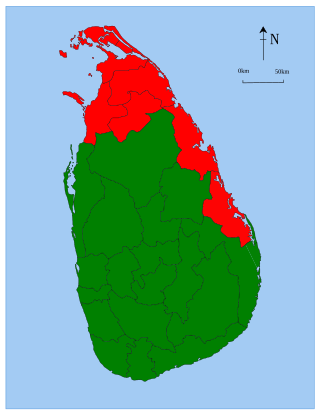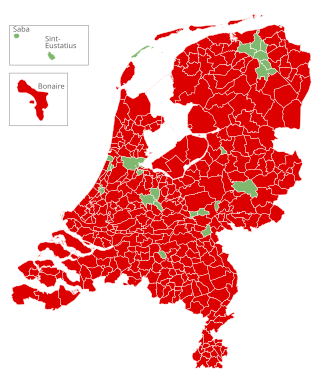
The Batavian Republic was the successor state to the Republic of the Seven United Netherlands. It was proclaimed on 19 January 1795 and ended on 5 June 1806, with the accession of Louis Bonaparte to the Dutch throne. From October 1801 onward, it was known as the Batavian Commonwealth. Both names refer to the Germanic tribe of the Batavi, representing both the Dutch ancestry and their ancient quest for liberty in their nationalistic lore.

A referendum is a direct vote by the electorate on a proposal, law, or political issue. This is in contrast to an issue being voted on by a representative. This may result in the adoption of a new policy or specific law, or the referendum may be only advisory. In some countries, it is synonymous with and also known as plebiscite, votation,popular consultation, ballot question, ballot measure, or proposition.

In California, a ballot proposition is a referendum or an initiative measure that is submitted to the electorate for a direct decision or direct vote. If passed, it can alter one or more of the articles of the Constitution of California, one or more of the 29 California Codes, or another law in the California Statutes by clarifying current or adding statute(s) or removing current statute(s).

This is a list of referendums related to the European Union, or referendums related to the European Communities, which were predecessors of the European Union. Since 1972, a total of 48 referendums have been held by EU member states, candidate states, and their territories, with several additional referendums held in countries outside the EU. The referendums have been held most commonly on the subject of whether to become a member of European Union as part of the accession process, although the EU does not require any candidate country to hold a referendum to approve membership or as part of treaty ratification. Other EU-related referendums have been held on the adoption of the euro and on participation in other EU-related policies.
In Australia, referendums are public votes held on important issues where the electorate may approve or reject a certain proposal. The term is commonly used in reference to a constitutional referendum which is legally required to make a change to the Constitution of Australia.

The Australian republic referendum held on 6 November 1999 was a two-question referendum to amend the Constitution of Australia. The first question asked whether Australia should become a republic, with a President appointed by Parliament following a bi-partisan appointment model which had been approved by a half-elected, half-appointed Constitutional Convention held in Canberra in February 1998. The second question, generally deemed to be far less important politically, asked whether Australia should alter the Constitution to insert a preamble. Since the early 1990s opinion polls had suggested that a majority of the electorate favoured a republic. Nonetheless, the republic referendum was defeated.

A consultative referendum on the Treaty establishing a Constitution for Europe was held in the Netherlands on 1 June 2005 to decide whether the government should ratify the proposed Constitution of the European Union. The result was a "No" vote.

A constitutional and electoral age referendum was held in Denmark on 28 May 1953. Both proposals were approved by voters, leading to both a new constitution taking effect on 5 June, and the electoral age being lowered from 25 to 23 years, also starting on 5 June. Voter turnout was 59.1% for the constitution question and 57.1% for the voting age question.

A constitutional referendum was held in Myanmar on 10 May 2008 according to an announcement by the State Peace and Development Council in February 2008. According to the military government, the new Constitution of Myanmar will ensure the creation of a "discipline-flourishing democracy". Multi-party elections followed in 2010.

A nationwide referendum was held in Moldova on 5 September 2010 on whether or not the country should amend the Constitution of Moldova to return to direct popular election of the president. Since 2001, the president had been indirectly elected by Parliament, with a supermajority of 61 seats required for election. The voters are asked to answer the following question: "Would you agree with the Constitutional amendment, which would allow the election of the President of the Republic of Moldova by the entire population?" Voters chose one of the proposed options: "Yes (for)" or "No (against)". Of those who had cast their vote, 87.83% chose "Yes". However, the referendum did not pass because only 30.29% of voters turned out, short of the necessary 33% for the referendum to be considered valid.

The 1982 Sri Lankan national referendum took place on December 22, 1982, giving the people of Sri Lanka the option to extend the life of parliament by 6 years. It was the first and so far only national referendum to be held in Sri Lanka. The referendum was called for by President J. R. Jayawardene, who had been elected to a fresh six-year term as President in October 1982. With the life of the current parliament due to expire in August 1983, Jayawardene faced the possibility of his ruling United National Party losing its massive supermajority in parliament if regular general elections were held. He therefore proposed a referendum to extend the life of parliament, with its constituents unchanged, thereby permitting the United National Party to maintain its two-thirds parliamentary majority.

A constitutional referendum was held in Madagascar on 17 November 2010, in which voters approved a proposal for the state's fourth Constitution. The Malagasy people were asked to answer "Yes" or "No" to the proposed new constitution, which was considered to help consolidate Andry Rajoelina's grip on power. Rajoelina heads the governing Highest Transitional Authority (HAT), an interim junta established following the military-backed coup d'état against then President Marc Ravalomanana in March 2009.
A constitutional referendum was held in the Batavian Republic on 6 October 1801. After a previous referendum in 1798 resulted in a new constitution being approved, the French were not satisfied with this constitution, and under their influence a new constitution was written.

An independence referendum was held in the Comoros on 22 December 1974. The overall result was a strong "yes" vote, with 94.57% of voters voting for independence and almost all the "no" votes being cast in Mayotte, where there was a majority for remaining under French control. In contrast, on Mohéli only five out of 6,059 votes were against independence. Voter turnout was 93.3%.

The current Constitution of Suriname was adopted on 30 September 1987, following a referendum. It marked the return to democracy after the Bouterse military dictatorship of the 1980s.
A referendum is a direct vote in which an entire electorate is asked to either accept or reject a particular proposal. This article summarises referendum laws and practice in various countries.

In the Netherlands, from the entry into force of the Advisory Referendum Act on 1 July 2015, until its repeal on 18 February 2018, most types of primary laws could be subjected to a suspensory, non-binding referendum if requested shortly after royal assent and subsequent proclamation. If a law was rejected by more than half of the votes cast, with a mandatory turnout of at least 30%, its entry into force was to be suspended indefinitely and a follow-up law had to be enacted that either repealed the law or provided for its entry into force.

An advisory referendum on the approval of the Ukraine–European Union Association Agreement was held in the Netherlands on 6 April 2016. The referendum question was: "Are you for or against the Approval Act of the Association Agreement between the European Union and Ukraine?"

A referendum on holding a constitutional convention was held in the US Virgin Islands on 3 November 2020 alongside general elections. 72% of voters responding to the referendum question voted in favor and turnout was above the threshold required.
Referendums in the Philippines are occasionally held at a national, regional or local level. Referendums can either by national or local in scope. In the Philippines, "referendums" and "plebiscites" mean different things.
















